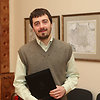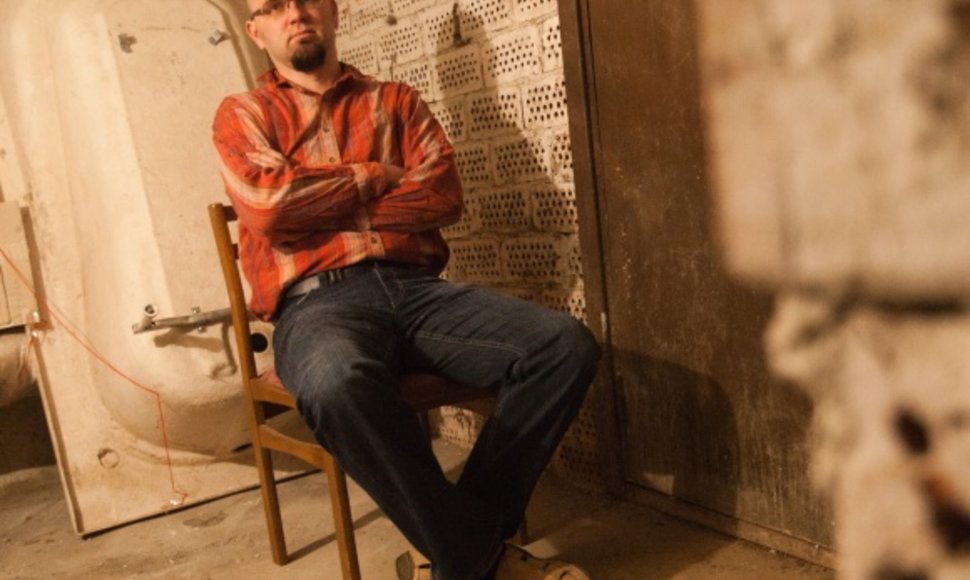People of the older generations might be surprised by this glance back at the soviet times as seen by a teenager; the author's own generation should nod approvingly – “Yes, that's exactly how it was” – while younger folks and people unfamiliar with soviet realities will probably marvel astonishingly: “Incredible, was it really so?”
- Let's start with sklepas (a room in a basement used for food storage) itself: have you indeed – as you claim in the book – used it for writing? Or is it one of those cases where the author and the narrator shouldn't be confused?
- It's hard to untangle them when all is in one big beard...
- In an essay entitled “Sklepas,” you reflect on the current place of literature – spacious salons have been replaced by cubbyholes. Do you think that writers and intellectuals were forced out to the basement?
- The role of literature has diminished everywhere, compared to, say, XIX century, when it was a dominant medium. In Lithuania, a contributing factor has been the change of political and economic “tracks.” In “Sklepas,” I try to consider what possible postures are left in the situation for a writer who refuses to indulge in self-deception and constant whining. But I also talk about the fact that literature is not a historic remnant. That it is not only about the size of readership, that there are other no less significant ways for literature to make an impact.
I would add that the current situation is not a destiny sent from above; to a great extent it depends on concrete circumstances in individual countries, for instance, on how healthy the media is and how much attention it pays to culture. A fair share of responsibility must go to literary people: to our passivity, delusions that others have to do the hard work.
- If one had to summarize what your essays are about, one would probably mention “self-perceptions of a young post-soviet man,” “looking expectantly westwards,” “soviet absurdity and legacy.” It doesn't sound like “anything new,” and yet, come to think of it, at least the younger generation should feel thirst for topics of such sort.
- Indeed, there hasn't been much writing on the recent past, which might account for the “thirst.” But once one begins to talk about it, one hears – “nothing new,” “heard that before,” etc. I'm not sure what's more at play here: Lithuanian conservatism or a conviction that the soviet and post-soviet past stands in our way towards becoming modern Europeans.
Topics like that are worth writing about not because of a resonance it might cause. It is a way to grasp our personal and collective experience. If left unreflected, untold, let alone ignored, it is bound to repeat itself in the present – becoming increasingly less perceptible, better adapted to new circumstances, like a virus. There's no need to list all the examples of the “eternal recurrence” – they are well known to everyone.
It is my conviction that, in order for our life to change profoundly, these things are far more important than the GDP growth or legislative incorporation of the EU law. And vice versa, the extent of change can be measured by the actuality of our dictatorial past. For eastern Germans, it is almost a thing of the past, and yet they spent decades dissecting it from all possible angles. A friend of mine from Andalusia, several years my junior, keeps talking about the Franco regime as if it ended yesterday.
- Another essay, “Moscow dumplings,” describes a headmaster from you school who, back in 1987, proclaimed the greatest Lithuanian national holiday to be the establishment of Lit-Bel Socialist Republic (a short-lived regime established under Red Army occupation in 1919) anniversary and, barely several years later, stood prominently in the 16 February (Lithuanian independence day) celebrations. Did anyone note such impressive changes of heart?
- Sons of political prisoner Valentinas Ardžiūnas went to my school and, already in that meeting, they ventured to publicly question the reputable historians. And with the start of Sąjūdis (a popular movement for Lithuanian independence in the late 1980s), our headmaster's sickness absence became increasingly frequent. Most students – and probably teachers too – were simply happy being left alone. That was the most common reaction back then.
- Your teenage years make an exceptionally gripping read. For instance, you talk about how you were being told that AC/DC wore Wehrmacht uniforms on stage and that U2 was a German submarine model. There must have been people who believed that?
- As we all know, there were only two colours in the soviet palette. Everything that wasn't part of the progressive world, was painted in black shades of imperialism and fascism. The propaganda machine tried to discredit the musicians that youngsters admired by accusing them of fascist sympathies – and that was also an excuse for banning their music.
Punks, who were dissatisfied with the system and couldn't check how accurate a world depiction they were given, might have been taken in by some of the stuff. I've seen an inscription on a fence near the Cathedral that said “RIP Hitler” with his birth and death dates. No one from my circles though that was true. After all, it did sound preposterous. I don't believe there were many who believed it, since it was a very dangerous matter.
- After every propagandistic TV broadcast from Moscow, your father would say “Lozh, pizdyozh i provokacya” (“Lies, bullshit, and provocation”). After hearing this, wasn't there an urge for a young man to go and take it out on neighbourhood peers who, as your essays reveal, were mostly Russian-speaking? Was there a temptation to “make things right”?
- Father wouldn't say that. The phrase came from many people I knew. I think that friction between punks and Russians had been more intense before Sąjūdis began. After it started, it seems that all this receded to background – or perhaps became part of the overall policy?
I remember, we were going to a demonstration at the Parliament with posters and we cut corners through a Russian school yard. The pupils didn't seem friendly in their expressions and remarks. However, the general upbeatness that everyone felt at the time prevented us from identifying local Russians with the “centre” in Moscow. We all assumed that there were merely a handful of the “ideologically-minded,” totally negligible, and the rest understand – or would come to understand – what Lithuanians wanted.
- If we were to trust the polls, two thirds of Lithuanian residents would choose economic wellbeing over their country's independence. In the book, you recall how you couldn't stand it when a friend – a writer from Russia – grinned ironically at the mention of the word “freedom” – since, you know, you've got industrial development, free health care, police-guaranteed order, intellectuals in touch with the people, a man in space. Why do you think freedom finally became “affordable”?
- That's a dreadfully boring question to ask in a poll. One should ask more interesting things: would you prefer your country's independence or your relative recovering from an illness? Would you choose independence or a chance to circle the Earth in a spaceship? I'd be interested to see the percentages then. By the way, not once in 20 years have I been asked to take part in a poll. Perhaps because I'm a man from sklepas and do not seem representative of the society at large?
I can just repeat a truism – freedom is great but difficult, something we appreciate only retrospectively. National independence and personal wellbeing belong to different levels of freedom and, ideally, do not contradict each other. Although the ideal is still a long way off, I can see more of hopeful signs than soviet echoes.
What I'm most interested in is how various forms of freedom express themselves in individual lives. Our principles and compromises, choices and non-choices (on wellbeing vs independence), dreams, possibilities and obstacles, works and procrastinations. After all, that is what makes a country's economy, politics, and culture, isn't it?
***
Laurynas Katkus (b. 1972) – poet, essayist, literary historian. Studied Lithuanian at Vilnius University, then German and Comparative Literature in Leipzig and Berlin. Defended a thesis on exile in modern Lithuanian and German poetry.
Entered the literary world with a collection of poems “Voices, Notes” (1998). Has published two more collections of poetry. Some of his books were published in Germany and the US.
Has translated books from English and German. They include: “On Photography” by Susan Sontag, “Illuminations” by Walter Benjamin, Friedrich Hoelderlin's poetry.
“Sklepas and Other Essays” was first published in Germany before appearing in Lithuania.













